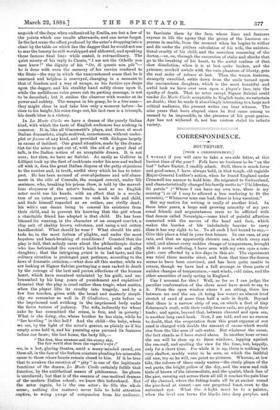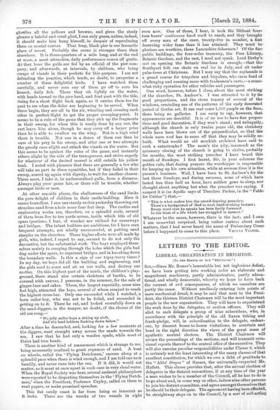CORRESPOND EN CE.
SOUTHPORT.
[PROM A CORRESPONDENT.]
I WONDER if you will care to take a sea-side letter, at this busiest time of the year ? Folk have no business to be "on the loaf" before Easter, I readily admit. Still, there is much force and good-sense, I have always held, in that tough, old regicide Major-General Ludlow's action, when he found England under Cromwell too narrow to hold him. He migrated to Switzerland, and characteristically changed his family motto to" Uhl hbertas, ibi patria" (" Where I can have my own way, there is my country ") or (if I may be allowed a free rendering to fit the occasion), "Whenever man can loaf, there is long vacation."
But my motive for writing is really of another kind. In these later years, a large and growing minority of my per- sonal friends and acquaintances seem to be afflicted with that demon called Neuralgia,—some kind of painful affection connected with the nerves of the head and face, which makes the burden of life indefinitely heavier to carry than it has any right to be. To all such I feel bound to say,— Give this place a trial in your first leisure. In one case, at any rate, and that an apparently chronic one, in which every east wind, and almost every sudden change of temperature, brought with it acute suffering, I have seen with my own eyes a corn- plet5 cure effected by a few days in this air. The experiment was tried three months since, and from that time the demon seems to have been exorcised, and has been quite unable to return, though we have had a full average in these parts of sudden changes of temperature,—east winds, cold rains, and the other amenities of early spring in England.
Can I account for this Well, so far as I can judge, the peculiar conformation of the shore must have much to say to it. From the open window where I am sitting, there lies between me and, the sea (it being low water) an almost level stretch of sand of more than half a mile in depth. Beyond that there is a narrow strip of sea, on which a fleet of tiny fishermen's craft, with their ruddy-brown sails, are plying their trade; and again, beyond that, between channel and open sea, is another long sand-bank. Now, I am told, and see no reason to doubt, that the evaporation from this great expanse of wet sand is charged with double the amount of ozone which would rise from the like area of salt-water. But whatever the cause, the fact stands as I have stated above. In another hour or two the sea will be close up to these windows, lapping against the sea-wall, and spoiling the view for the time, but, happily, only for a short time. For while it is up, there is nothing but very shallow, muddy water to be seen, on which the faithful old sun, try as he will, can paint no pictures. Whereas, at low tide, the colours of these sandy wastes—the steely gleam of the wet parts, the bright yellow of the dry, and the warm and rich tints of brown of the intermediate, and the quaint, black line of the pier, running out across them all till it reaches the pale blue of the channel, where the fishing-boats all lie at anchor round the pier-bead at sunset—are one perpetual feast, even to the untrained eye. What the th light must be to a painter, when the level sun turns the blacks into deep purples, and.
glorifies all the yellows and browns, and gives the steely gleams a baleful and cruel glint, I can only guess, unless, indeed, it should make him hang himself, in despair of reproducing them on mortal canvas. That long, black pier is our favourite place of resort. Probably the ozone is stronger there than elsewhere. It is three-quarters of a mile long, and at the end at noon, a most attractive, daily performance comes off gratis. At that hour the gulls are fed by an official of the pier com- pany, and afterwards, at intervals, by children, who bring scraps of viands in their pockets for this purpose. I am not defending the practice, which tends, no doubt, to pauperise a number of these delightful birds. I have watched them carefully, and never seen one of them go off to earn his honest, daily fish. There they sit lightly on the water, with heads turned to the pier-head, and float past with the tide, rising for a short flight back again, as it carries them too far past to see when the doles are beginning to be served. When these begin, they are all in the air, wheeling and crossing each other in perfect flight to get the proper swooping-point. It seems to be a rule of the game that they pick up the fragments in their swoop, for when this is neatly done by any one, the rest leave him alone, though he may carry off a larger prize than he is able to swallow on the wing. But in a high wind there is trouble. Not one in a dozen of them can then be sure of his prey in his swoop, and after one or two attempts the greedy ones alight and attack the viands on the water. But this seems to be against the rules of the game, and instantly others alight by the side of the transgressor, and strive eagerly for whatever of the desired morsel is still outside his yellow beak. I noted with pleasure that there are generally a few who will take no part in these squabbles, but if they failed in their swoop, soared up again with dignity, to wait for another chance. These must, I take it, be undemoralised gulls, from a distance. Always play your game fair, or there will be trouble, whether amongst birds or men.
At other sea-side places, the shallowness of the sand limits the pure delight of children in their castle-building. Here it seems boundless. I saw' one sturdy urchin yesterday throwing out stoneless sand from a hole some four feet deep. The castles and engineering works are, therefore, on a splendid scale, several of them from five to ten yards across, inside which bits of old spars (portions, I fear, of wrecks) are utilised for causeways and bridges. The infant builders are ambitious, for I have seen frequent attempts, not wholly unsuccessful, at putting sand steeples on the churches. These higher efforts were all made by girls, who, indeed, I regret to say, seemed to do not only the decorative, but the substantial work. The boys employed them- selves mainly in creeping through the holes which the girls had dug under the spars, to represent bridges, and in knocking down the boundary walls. Is this a sign of our topsy-turvy times ? In my day, we boys did all the building and engineering, and the girls used to come and sit on our walls, and destroy our castles. On this highest part of the sands, the children's play- ground, there stand also certain skeletons of booths, to be covered with canvas, I presume, in the summer, for the sale of ginger-beer and cakes. These, the largest especially, some nine feet high, attracted the boys, several of whom essayed to reach the highest cross-bar. Only one succeeded while I watched, a born sailor-boy, who was not to be foiled, and succeeded in getting on to it. There he sat, and looked scornfully down on the sand-diggers, in the temper, no doubt, of the chorus of the old sea song.—
" We jolly sailor-boys a sitting up aloft,
And the land-lubbers funking down below."
After a time he descended, and, looking for a few moments at the diggers, went straight away across the sands towards the sea. I saw that he had only a wooden spade, while most of theirs had iron beads.
There is another kind of amusement which is strange to me, being necessarily confined to great expanses of sand. A boat on wheels, called the- 'Flying Dutchman,' careers along at a splendid pace when there is wind enough, and I am told can tack handily, and never runs into the sea. If it did, it would not matter, as it must at once upset in such case in very shoal water. When the Royal Society was here, several eminent philosophers were reported to be disporting themselves in the Flying Dutch- man,' when the President, Professor Cayley, called on them to read papers, or make promised speeches.
This flat sandy coast is far from being so innocent as it looks. There are the wrecks of two vessels in sight even now. One of these, I hear, it took the lifeboat four- teen hours' continuous hard work to reach, and they brought off every man of the crew, twenty-five in number, a feat deserving wider fame than it has attained. They must be. glorious sea worthies, these Lancashire fishermen Of the fine public buildings, the four-miles tramway, the Free Library,. Botanic Gardens, and the rest, I need not speak. Lord Derby's. mot on opening the Botanic Gardens is enough,—that the- Southport folk can skate on real ice in July, and sit under palm-trees at Christmas. But I may say that the esplanade is a grand course for tricyclers and bicyclers, who seem fond of challenging and running races with tradesmen's carts,—a some- what risky operation for other vehicles and passengers.
One word, however, before I close, about the most striking- of the churches, St. Andrew's. I was attracted to it by its- good proportions, and the stone tracery of several of the windows, reminding one of the patterns of the early decorated- period of Gothic art. It can seat some 1,500 people on the floor,.
there being no galleries. I am sorry to say, however, that appearances are deceitful. It is of no use to have fine propor- tions and good decoration, if they won't stand ; and unhappily,. although the church is only twelve years old, the cleristory
walls have been blown out of the perpendicular, so that the whole nave roof has to come .off that they may be solidly re-
built. What would an old monkish architect have said to
such a catastrophe The more's the pity, inasmuch as the-
necessary closing of the church is going to shelve, probably for months, the most striking preacher I have heard this month of Sundays. I first learnt, Sir, in your columns the golden rule, that during prayers the worshipper is responsible- for keeping up his own attention, while at sermon-time it is the-
parson's business. Well, I have been to St. Andrew's for the- last three Sundays, and during sermons, none of which have-
lasted less than half an hour, have neither gone to sleep, nor- thought about anything but what the preacher was saying. I suspect it is (as Apollo says of Theodore Parker, in the "Fable- for Critics ") that,—
" This is what makes him the crowd-drawing preacher, There's a background of God to each hard-working feature ; Every word that he speaks has been fierily furnaced In the blast of a life which has straggled in earne*.t.'
Whatever be the cause, however, there is the tact; and I own I am somewhat surprised, being rather curious about such matters, that I had never heard the name of Prebendary Cross.
beforeI happened to come to this place. VACI; us VIATOR.



































 Previous page
Previous page